Ask many Arsenal supporters or most members of the media, and they’ll use grandiose terms like revolutionary and generational to describe Mikel Arteta’s tenure as manager. The truth is a little different.
Mikel Arteta preparing for a 200th game as Arsenal manager is an ideal time to properly asses his tenure. Properly is the key word because separating hype from reality has become increasingly difficult during the run to 200 that culminates with a sticky trip to Brentford.
Arteta’s been a hipster’s dream who’s done plenty of good things. He’s also had some notable failures and not always rewarded patience with the promise described in his much-lauded ‘project’ and revered ‘process’.
The two P’s have defined Arteta’s stint. He’s used them to create a protective bubble most managers would crave.
Win, and Arteta’s project is ahead of schedule. Lose, and the process just needs more time. Nice work if you can get it.
Those are the broad strokes, but what about the nitty-gritty? Here’s the good and bad of Arteta’s reign, starting with the good.
Arteta has restored the very best of Wenger
Although he succeeded Unai Emery, Arteta was always going to be judged through the prism of Arsene Wenger. Ironically, restoring two of the best things from the Wenger era represents some of Arteta’s finest work.
Wenger’s decorated tenure was defined by two things: youth and style. Arteta has restored both.
Like Wenger, he’s put his faith in a young squad, and the youth movement bossed the Premier League for most of the 2022/23 campaign.
Arsenal are topping the table with the youngest squad in the Premier League (average age 23.7 years old) 👶 pic.twitter.com/G2lc20TlsC
— ESPN UK (@ESPNUK) November 13, 2022
Last season was Arteta’s third full campaign at the helm. It took time, but he finally got Arsenal playing free-flowing football again.
While it’s not quite as sudden and slick as peak Wenger-nomics, Artetaball is almost always expansive and entertaining. It’s a credit to the manager who went all George Graham and parked the bus en route to winning the FA Cup in 2020.
Since then, Arteta has taught his teams to pass from the back with precision and purpose, leading to some superb, back-to-front team goals.
Another great team goal for Mikel Arteta's @Arsenal 🙌
— Football on TNT Sports (@footballontnt) September 12, 2020
Passing from front to back, captain Aubameyang with a sublime finish 🔥 pic.twitter.com/732lVRDbJG
Arteta has been keen to keep Wenger’s legacy relevant. Ironic, since many of the fans who afford Arteta cult-like status were among the most vocal heckling Wenger through the exit door.
Many of those who lobbied for change wanted tougher, more decisive leadership. Arteta has at least provided the latter.
Making a tough call is one of his best qualities, even if you don’t agree with his judgment. Arteta never ducks tricky decisions, one reason he emerged with credit from public standoffs with high-profile players Mesut Ozil and Pierre-Emerick Aubameyang. Perhaps it will be different with Aaron Ramsdale.
Those are the things Arteta’s got right. Here’s what has gone wrong.
If at first you don’t succeed, spend, spend and spend again
Most managers at the top level share the same two worries: time and money. Specifically, not having enough of either.
That hasn’t been a problem for Arteta. He clearly has the ear of Josh Kroenke and has been given all the time and cash he needs.
Copious amounts of Kroenke dough have let Arteta assemble a squad at an eye-watering cost.
Arsenal now have the highest squad value in the Premier League according to Transfermarkt 💰 pic.twitter.com/VZX0wYOtsQ
— ESPN UK (@ESPNUK) July 19, 2023
Throwing cash at problems hasn’t always translated into success. Arteta’s transfer policy can be viewed as spending to correct one expensive mistake after another.
First, it was acknowledging handing bloated contracts to veterans like Willian and David Luiz didn’t work. Then it was Project Youth Redux, with only a few signings bearing fruit.
Gabriel Magalhaes, Martin Odegaard and Aaron Ramsdale worked out, but Arteta-fronted buys like Pablo Mari, Nuno Tavares, Albert Sambi Lokongoa and Alex Runarsson did not. Thomas Partey has been crocked often enough to barely merit a passing grade, while the jury’s still out on Fabio Vieira.
News that Arsenal will let central defender Jakub Kiwior pursue a loan barely a year into his Arsenal career is another worrying sign, so is Arteta spending more to make amends for every misstep in the market.
Like spending £45m on Gabriel Jesus, a striker who, by his own admission, views goals as “not my strong point.” Then there’s £65m missing man Kai Havertz.
No matter. Arteta can just dip back into the market and spend a packet to sign Brentford’s Ivan Toney and poach yet another Manchester City player, Kalvin Phillips (hypothetically). Simple.
So much time and money means Arteta should have Arsenal at least competing for major trophies. He’s ticked that box but has still gone three seasons without silverware.
When you turn down the hype-o-meter, Arsenal have spent billions for Arteta to return the club to where it was during most of the second half of Wenger’s tenure. In the UEFA Champions League and playing attractive football, but dropping too many points in tough fixtures and not staying the course in a title race.
The more things change, the more they stay the same.
Arteta has strived to make his own mark, but his best signings (Jesus and Oleksandr Zinchenko) and most innovative tactical ideas (inverted full-backs, high-pressing strikers) have come straight out of the Pep Guardiola playbook. Taking inspiration from Guardiola is no bad thing, but sooner rather than later Arsenal need Arteta’s process to deliver the results promised.
It shouldn’t take spending a fortune while rivals Manchester United and Chelsea slip into mediocrity to make it happen. Not if Arteta is as good as advertised.
His first 200 games have mostly whetted the appetite. The next 200 need more substance to go with the style.
